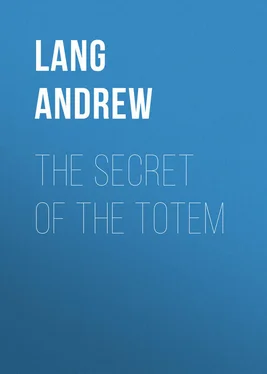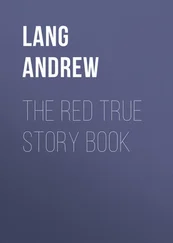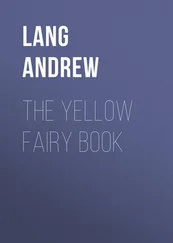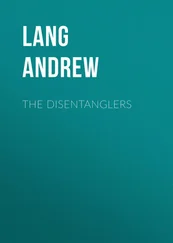Andrew Lang - The Secret of the Totem
Здесь есть возможность читать онлайн «Andrew Lang - The Secret of the Totem» — ознакомительный отрывок электронной книги совершенно бесплатно, а после прочтения отрывка купить полную версию. В некоторых случаях можно слушать аудио, скачать через торрент в формате fb2 и присутствует краткое содержание. Жанр: foreign_antique, foreign_prose, на английском языке. Описание произведения, (предисловие) а так же отзывы посетителей доступны на портале библиотеки ЛибКат.
- Название:The Secret of the Totem
- Автор:
- Жанр:
- Год:неизвестен
- ISBN:нет данных
- Рейтинг книги:4 / 5. Голосов: 1
-
Избранное:Добавить в избранное
- Отзывы:
-
Ваша оценка:
- 80
- 1
- 2
- 3
- 4
- 5
The Secret of the Totem: краткое содержание, описание и аннотация
Предлагаем к чтению аннотацию, описание, краткое содержание или предисловие (зависит от того, что написал сам автор книги «The Secret of the Totem»). Если вы не нашли необходимую информацию о книге — напишите в комментариях, мы постараемся отыскать её.
The Secret of the Totem — читать онлайн ознакомительный отрывок
Ниже представлен текст книги, разбитый по страницам. Система сохранения места последней прочитанной страницы, позволяет с удобством читать онлайн бесплатно книгу «The Secret of the Totem», без необходимости каждый раз заново искать на чём Вы остановились. Поставьте закладку, и сможете в любой момент перейти на страницу, на которой закончили чтение.
Интервал:
Закладка:
CHAPTER III
THEORY OF PRIMAL PROMISCUITY
Why did man, if once promiscuous, regulate the relations of the sexes? – Theory of Professor Spencer – Animal-named magical societies were prior to regulation of marriage – Theory of Mr. Howitt – Regulations introduced by inspired medicine man – His motives unknown – The theory postulates the pristine existence of the organised tribe of to-day, and of belief in the All Father – Reasons for holding that men were originally promiscuous: (1) So-called survival of so-called "group marriage"; (2) Inclusive names of human relationships – Betrothals not denied – A form of marriage – Mitigated by Pirauru – Allotment of paramours at feasts – Is Pirauru a survival of group marriage? – Or a rare case of limitation of custom of feasts of license – Examples of such saturnalia – Fiji, Arunta, Urabunna, Dieri – Degrees of license – Argument against the author's opinion – Laws of incest older than marriage – Names of relationships – Indicate tribal status, not degrees of consanguinity – Fallacy exposed – Starcke versus Morgan's theory of primal promiscuity – Dr. Durkheim on Choctaw names of relationships – A man cannot regard his second cousin as his mother – Dr. Fison on anomalous terms of relationship – Grandfathers and grandsons call each other "brothers" — Noa denotes a man's wife and also all women whom he might legally wed – Proof that terms of relationship do not denote consanguinity – The Pirrauru custom implies previous marriage, and is not logically thinkable without it – Descriptions of Pirrauru – The Kandri ceremony merely modifies pre-existing marriage — Pirrauru is not "group marriage" – Is found only in tribes of the Matteri Kiraru phratries – Not found in south-eastern tribes – Mr. Howitt's "survivals" do not mean "group marriage."
In the theories which postulate that man began in a communal horde, with no idea of regulating sexual unions at all – because, having no notion of consanguinity, or of harm in consanguine marriages, he saw nothing to regulate – the initial difficulty is, how did he ever come to change his nature and to see that a rule must be made, as made it has been? Mr. Howitt endeavours (if I grasp his meaning) to show how man did at last see it, and therefore bisected the horde into intermarrying phratries. Mr. Spencer has only asserted that, while man saw nothing to regulate in marriages, he evolved an organisation, that of the phratries and classes, which did come, somehow, to regulate them. Dr. Durkheim takes it, that man if he was originally promiscuous, later regulated marriages out of respect to his totems, which were his gods. Mr. Hill-Tout supposes that the exogamous rules were made for "political" reasons.
The theories of Mr. Howitt and Mr. Spencer differed from each other, originally, only in so far as that Mr. Spencer supposes animal-named magical societies (now totemic) to have arisen before man regulated marriage in any way; whereas this conception of animal-named groups not bound by totemic restrictions on marriage had not occurred to Mr. Howitt or any other inquirer, except Mr. J. G. Frazer, who evolved it independently. Mr. Spencer's theory in this matter rests entirely on his discovery, among the Arunta, in Central Australia, of totems marking magical societies, but not regulating marriage, and on his inference that, in the beginning, animal-named groups were everywhere mere magical societies. To work co-operative magic was their primary function. To that opinion Mr. Howitt has now come in, and he adds that "the division of the tribe" (into the two primary exogamous moieties or phratries, or "classes") "was made with intent to regulate the relations of the sexes." 28 28 Native Tribes of South-East Australia , p. 89.
On one point, we repeat, namely, why division was made, Mr. Spencer utters no certain sound, nor does Mr. Howitt explicitly tell us for what reason sexual relations, hitherto unregulated, were supposed to need regulation. He conceives that there is "a widespread belief in the supernatural origin of the practice," but that explains nothing. 29 29 Native Tribes of South-East Australia, p. 90.
Thus Mr. Howitt postulates the existence of a "tribe," divided into animal-named magical societies, and promiscuous. The tribe has "medicine men" who see visions. One of these men, conceiving, no one knows why, that it would be an excellent thing to regulate the relations of the sexes, announces to his fellow-men that he has received from a supernatural being a command to do so. If they approve, they declare the supernatural message "to the assembled headmen at one of the ceremonial meetings," the tribe obeys, and divides itself into the two primary exogamous moieties or phratries. 30 30 Loc. cit. Mr. Howitt says "classes," but we adhere to the term "phratries."
Mr. Howitt thus postulates the existence of the organised tribe, with its prophets, its "All Father" (such as Daramulun), its magical societies, its recognised headmen, and its public meetings for ceremonial and legislation, all in full swing, before the relations of the sexes are in any way regulated.
On reflection, Mr. Howitt may find difficulties in this postulate. Meanwhile, we ask what made the very original medicine man, the Moses of the tribe, think of the new and drastic command which he brought down from the local Sinai? Why did this thinker suppose that the relations of the sexes ought to be regulated? Perhaps the idea was the inspiration of a dream. Mr. Spencer, acquainted chiefly with tribes who have no All Father, has not advanced this theory.
The reasons given for supposing that the "tribe" was originally promiscuous are partly based (a) on the actual condition as regards individual marriage of some Australian tribes, mainly Dieri and Urabunna, with their congeners. These tribes, it is argued, are now no longer absolutely promiscuous, but men and women are divided into intermarriageable sets, so that all women of a certain status in Emu phratry are, or their predecessors have been, actual wives of all men of the corresponding status in Kangaroo phratry. The only bar to absolute promiscuity is that of the phratries (established by legislation on this theory), and of certain by-laws, of relatively recent institution. The names for human relationships (father, mother, son, daughter, brother, sister), again, (b) are, it is argued, such as "group marriage," and "group marriage" alone, would inevitably produce. All women of a certain status are my "mothers," all men of a certain status are my "fathers," all women of another status are my "sisters," all of another are my "wives," and so on. Thus Mr. Spencer is able to say that "individual marriage does not exist either in name or in practice in the Urabunna tribe" at the present day. 31 31 Natives of Central Australia , Spencer and Gillen, p. 63.
This, however, does not mean that among many such tribes a man is not betrothed to a special woman, and does not marry that woman, with certain filthy initiatory "rites," contravening the usual rules of intercourse. 32 32 Spencer end Gillen, pp. 92-98.
Nor is it denied that such man and wife habitually cohabit, and that the man, by hunting and fishing, provides for the wife and all her children, and recognises them as his own.
It is meant that each man has only a certain set of nubile women open to him ( Nupa , or Noa , or Unawa ), and that out of these, in addition to his allotted bride, an uncertain number of women are assigned to him and to others, mainly at tribal festivals, as paramours ( Pirauru or Piraungaru ), by their elder brothers, or the heads of totem kins, or the seniors of the Urabunna tribe. "This relationship is usually established at times when considerable numbers of the tribe are gathered together to perform important ceremonies." 33 33 Natives of Central Australia , Spencer and Gillen, p. 63.
One woman may, on different occasions, be allotted as Piraungaru to different men, one man to different women. Occasionally, though rarely, the regular husband (he who marries the wife by filthy "rites") resists the allotting of his wife to another man, and then "there is a fight."
Интервал:
Закладка:
Похожие книги на «The Secret of the Totem»
Представляем Вашему вниманию похожие книги на «The Secret of the Totem» списком для выбора. Мы отобрали схожую по названию и смыслу литературу в надежде предоставить читателям больше вариантов отыскать новые, интересные, ещё непрочитанные произведения.
Обсуждение, отзывы о книге «The Secret of the Totem» и просто собственные мнения читателей. Оставьте ваши комментарии, напишите, что Вы думаете о произведении, его смысле или главных героях. Укажите что конкретно понравилось, а что нет, и почему Вы так считаете.












